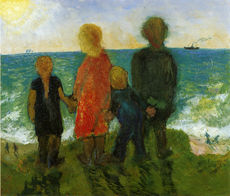Religion
Welcome to the Secular Life
What the heck does it mean to live a secular life? What's this blog all about?
Posted June 9, 2014

Religion is a wonderful thing: it provides hope, generates community, promotes charity, offers comfort, and creates a connection to the divine.
And yet millions of people today want little or nothing to do with it.
Despite the fact that most humans are religious, believe in God, find solace in prayer, wisdom in ancient scriptures, guidance in prophets, comfort in rituals, and inspiration in faith – a growing chunk of humanity is opting out.
More and more men and women are living their lives without the many things that religion provides. They don’t believe in a god. They don’t feel the need to be saved. They are skeptical – or merely indifferent – when it comes to holy scriptures. They find pews uninviting. They find religious rituals foreign or embarrassing. They find the mixing of religion and politics worrisome. And in terms of their personal worldview, they value reason over faith and science over superstition -- and they harbor hope for this world, rather then some purported world beyond.
To be secular is to live one’s life without belief in anything supernatural – be it God, Jesus, hell, miracles, jinn, or reincarnation. It also means being quite open to awe and mystery, wonder and bliss, or mystical pondering, and yet always (to paraphrase David Hume) proportioning one’s belief – in anything -- to the evidence at hand.
To be secular means to live one’s life outside the church, mosque, synagogue, ashram, or temple walls; to find community elsewhere, to celebrate elsewhere, and to raise one’s children in non-religious settings.
To be secular means that one grounds his or her ethics based on his or her own inner moral compass – one’s conscience – and strives to treat other people the way s/he wishes to be treated him/herself. No God is required for such morality – just human empathy.
To be secular means a whole lot more; just as religious people differ on their own understandings of what it means to be religious, the same holds true for secular people. And as the number of secular people continues to grow worldwide, so too does the diversity and complexity of just what secularity entails.
Recognizing that both the number of humans who identify as non-religious is on the rise – and that this phenomenon is generating a plethora of different identities, meanings, and experiences when it comes to irreligiosity -- this blog is devoted to understanding secular living: how men and women live their lives, endure trying times, find a sense of meaning and purpose, create community, experience awe and transcendence, deal with death, raise their kids, etc., etc. – all without religious faith or involvement.
At times the writings will be quite personal. At other times they will be based on scientific findings within the realms of sociology, anthropology, and psychology. At other times, philosophy will be brought forth.
But ultimately, the goal will be simple: to shed light on secular living – a noble and enriching way of life. Or at least, if nothing more, one that is based in reality.


